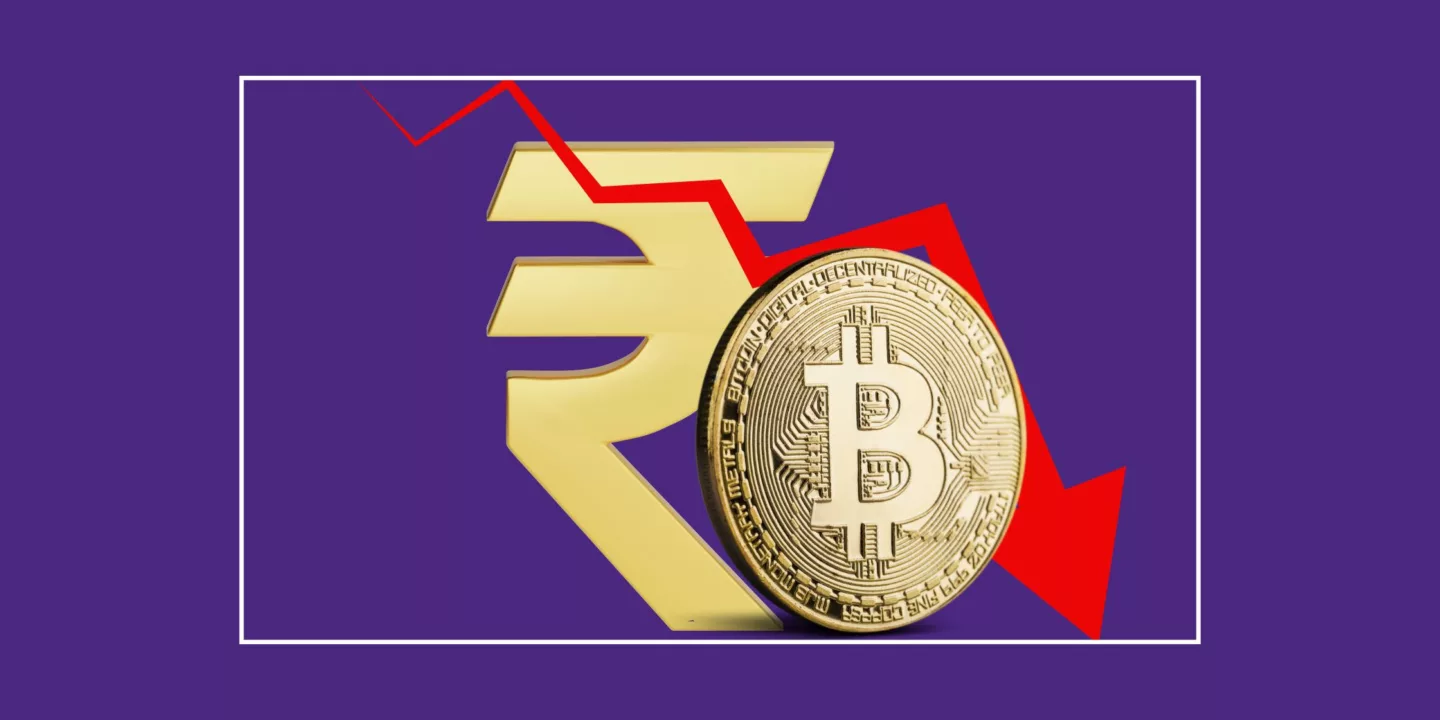
The Indian Rupee (INR) has recently experienced significant depreciation against major global currencies, raising concerns for individuals and businesses. In response to this economic challenge, many are turning to alternative investment options, with Bitcoin emerging as a popular choice.
As the world’s first decentralized cryptocurrency, Bitcoin offers unique advantages, particularly in an environment marked by currency instability. But how is INR depreciation linked to Bitcoin’s growing appeal in India? This blog delves into Bitcoin’s causes, benefits, and risks, exploring its increasing popularity in India.
INR depreciation refers to the decline in the value of the Indian Rupee relative to foreign currencies, particularly the US Dollar (USD). This can happen when factors like trade deficits, inflation, rising crude oil prices, and geopolitical instability negatively affect India’s economic standing. For example, in 2023, the INR reached historic lows against the USD, crossing ₹83 per dollar, leading to widespread economic consequences.
The depreciation of the INR affects various aspects of the Indian economy, including:
As the INR continues to lose value, many Indians are seeking alternative means to preserve their wealth—leading them to explore Bitcoin.
Bitcoin is increasingly being viewed as a hedge against traditional currency depreciation. Here’s why:
When currencies like the INR depreciate, Bitcoin becomes an attractive digital alternative that offers stability and protection against the erosion of purchasing power.
India has witnessed a surge in Bitcoin adoption, and the weakening Rupee plays a significant role. Here are the key factors:
With the value of the INR continuously falling, many Indians are seeking ways to preserve their wealth. Bitcoin offers a decentralized store of value, especially during periods of economic instability. By including Bitcoin in their investment portfolios, individuals can hedge against the risks posed by currency depreciation.
Bitcoin’s decentralized nature means it is not reliant on traditional banking infrastructure, which is still underdeveloped in certain rural areas of India. This is particularly appealing to people in underserved regions who may not have easy access to financial services.
As the INR depreciates, inflation tends to rise. Bitcoin’s limited supply and deflationary characteristics make it an effective hedge against inflationary pressures. Historically, Bitcoin prices have surged during periods of high inflation, providing a counterbalance to depreciating fiat currencies.
India is home to one of the youngest and most tech-savvy populations in the world, making it a prime market for Bitcoin adoption. As digital payments and cryptocurrencies become more mainstream, many Indians are turning to Bitcoin as a viable investment option. Platforms like Mudrex have made it easier for newcomers to trade and invest in cryptocurrencies.
India’s stance on cryptocurrency has been evolving, but the lack of a clear regulatory framework remains a significant hurdle. While Bitcoin is not banned, it operates in a legal grey area. Recent developments include:
READ ALSO: Future of Crypto Regulations Under Trump: Will They Ease in 2025?
Despite the uncertainty surrounding regulations, Indian interest in Bitcoin has only increased. The introduction of taxation laws has provided a level of legitimacy to crypto investments. However, more clarity is needed to foster long-term confidence and adoption.
While Bitcoin offers several advantages, it’s essential to consider the risks involved in using it as a hedge:
As such, investors need to carefully assess these risks and consider diversifying their portfolios.
INR depreciation presents significant challenges to the Indian economy, prompting many to seek alternative investment options. Bitcoin has emerged as a promising solution, offering wealth preservation, protection against inflation, and global accessibility. However, it’s important for individuals to carefully consider the risks and regulatory landscape surrounding Bitcoin before diving in.
Platforms like Mudrex provide easy-to-use, secure tools for those interested in exploring Bitcoin and other cryptocurrencies. Whether you’re looking to diversify your portfolio or hedge against economic uncertainty, Mudrex is a reliable partner for your investment journey. Get started now!
INR depreciation is driven by factors like trade deficits, inflation, rising crude oil prices, and geopolitical tensions. A weaker rupee impacts imports, debt repayment, and overall economic stability.
Bitcoin offers a decentralized, inflation-resistant store of value. It allows investors to protect their wealth from the depreciation of fiat currencies like the INR.
Bitcoin investments come with risks such as price volatility, regulatory uncertainty, and security concerns. Thorough research and diversification are essential for mitigating these risks.
India has introduced taxes on crypto gains but lacks a clear regulatory framework. The regulatory environment remains uncertain, posing a challenge for widespread adoption.
While Bitcoin can be used for transactions, its adoption for everyday payments is still limited due to regulatory uncertainty and its price volatility.